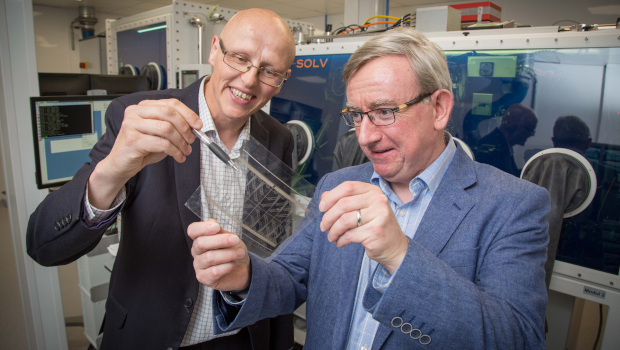
NUI Galway opens two state-of-the-art research facilities
NUI Galway (NUIG) has established two new research facilities: a pilot line for bio-microsystems development, and an advanced manufacturing laboratory. The expansion is part of the university’s expanding biomedical research and advanced manufacturing infrastructure.
Bio-microsystems development
The first of its kind globally, the integrated, advanced manufacturing testbed will accelerate the translation of lab-based research concepts towards pilot production.
The facility will manufacture printed electronics and printed biomaterials, which complements the university’s existing expertise and investment in biomaterials and stem cell manufacturing. It will be used to evaluate the advanced manufacturing of smart medical devices and tissue-engineered organs on a chip device.
Funded by Science Foundation Ireland, Dr Gerard O’Connor, head of the school of Physics at NUIG, has been developing the testbed for the past five years. He said the ability to integrate electronic, optical and thermal stimuli in flexible medical devices “will be transformative – changing the way we connect with and use future healthcare products.”
Empowered with diagnostic and therapeutic functionalities, smart devices are particularly relevant to Galway’s medical device industry.
A smart wound care device can assess the status of the wound and administer a drug accordingly. The testbed would enable Galway researchers to demonstrate how such a device could be realised by using scalable printed technologies.
The manufacturing testbed can also be used to generate tissue scaffolds; arrays of artificial tissue developed to mimic different organs. In developing advanced therapeutic medicinal products, the importance of producing tissue scaffolds on a scalable platform has grown significantly. Cell-based therapies to cure chronic illnesses can be evaluated by using arrays of tissue scaffolds which can mimic disease states.
Dr O’Connor said: “The new facility enables the NCLA Laser Laboratory to investigate the versatility of using multiple laser patterning, inkjet printing and spray deposition tools in the advanced digital manufacture of next generation smart medical devices and therapeutic devices.”
Advanced manufacturing
The second new facility, an advanced manufacturing laboratory, was developed by Dr Noel Harrison from the College of Engineering at NUIG to advance teaching, research and industry collaboration.
Home to NUIG’s first metal powder bed fusion printer, the facility has advanced the capacity for prototyping and experimental manufacturing. A vital improvement as “multiple industries now demand engineering graduates with knowledge and experience in 3D Printing,” Dr Harrison said.
I-Form director, Prof Denis Dowling said: “Manufacturing is the second largest employer in Ireland and accounts for 36.5% of GDP.”
He added that the testbeds “are key pieces of infrastructure for the manufacturing research community, and they will ensure that Irish manufacturers continue to have access to leading edge technology for the development of world-class products”.
TechCentral Reporters






Subscribers 0
Fans 0
Followers 0
Followers